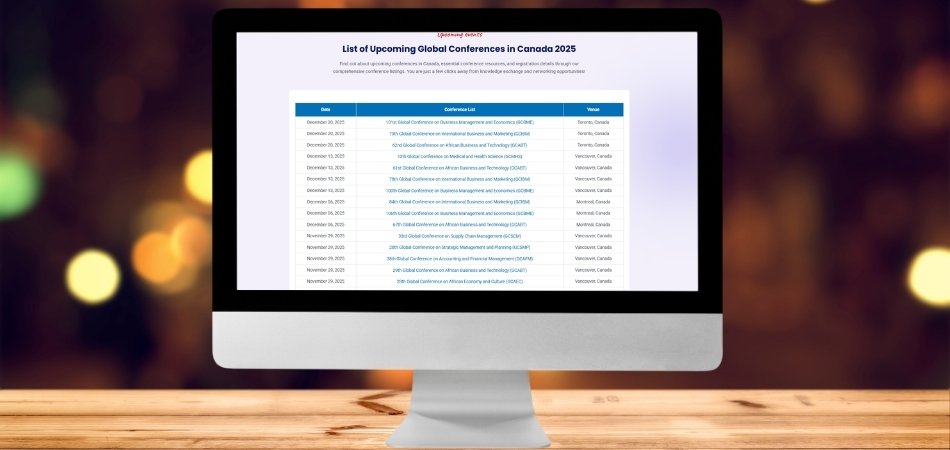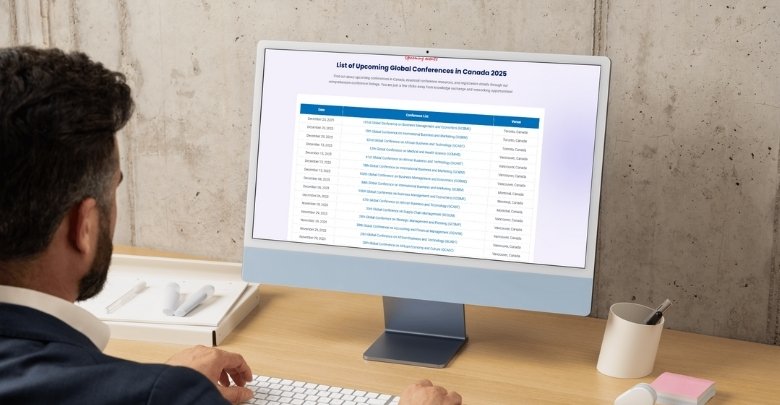A conference presentation is a powerful way to showcase your research, establish credibility, and build your professional network. But with so many options available, how to find a conference in Canada for your presentation?
To find a conference in Canada for your presentation, check out online resources like Global Conference Alliance, professional association websites, and university event calendars. Find the best match by filtering results based on your topic and preferred location. Additionally, follow industry-specific websites and social media platforms like LinkedIn to stay updated on upcoming events.
By using these strategies, you can discover the right conference that aligns with your expertise. Read on to discover more tips for finding the perfect conference in Canada.
How to Find a Conference in Canada for Your Presentation? Effective Steps
Finding the right conference in Canada for your presentation may seem complicated, but it isn’t. With the right tools and strategies, you can find events that match your interests and expertise. Here’s a step-by-step procedure to help you get started:
Step 1: Start with Online Conference Directories
Online directories are great for finding conferences in Canada. Websites like Global Conference Alliance list multiple events happening across the country. You can easily search for an upcoming conference in Canada that matches your interests. These platforms allow you to filter conferences by date, location, and subject.
Step 2: Check Professional Association Websites
Professional associations often host conferences relevant to your field. They also provide detailed information about upcoming events. By browsing their websites, you’ll find conferences tailored to your specific topic. Joining these associations may also offer exclusive access to events and networking opportunities.
Step 3: Explore University Event Calendars
Many universities in Canada organize conferences throughout the year. These events can offer a great platform for presenting new ideas. University event calendars are usually up to date with the latest happenings. Most of these events welcome professionals and students alike to participate.
Step 4: Use Social Media for Updates
Social media platforms like LinkedIn can be valuable for finding conferences. Many conference organizers post updates and calls for speakers on their profiles. By following relevant industry groups, you’ll stay informed about new events. It’s also a great way to engage with other professionals in your field.
Step 5: Research Industry-Specific Websites
Industry-specific websites often list conferences and events relevant to your work. Websites dedicated to specific sectors provide an up-to-date directory of upcoming conferences. These sites help you connect with peers in your field. Many also feature forums where you can discuss upcoming events with others.
Step 6: Filter Based on Topic and Location
Once you’ve found a list of potential conferences, it’s important to narrow your choices. Filter by your presentation topic to ensure relevance. Additionally, consider the location of the event, as some conferences may be virtual or regional. This helps you focus on events that meet both your logistical and professional needs.
Step 7: Stay Updated With Conference Newsletters
Many conferences offer newsletters that provide timely updates. Signing up for newsletters ensures that you won’t miss important announcements. Organizers use newsletters to send reminders about deadlines and event details. They are a great way to keep track of conferences you’re interested in.
Can You Gain Anything From Presenting at a Canadian Conference?
Yes, presenting at a Canadian conference offers valuable opportunities for professional and personal growth. It allows you to share your expertise and build meaningful connections. Here’s what you can gain from presenting at a conference in Canada.
Expand Your Network
Conferences bring together professionals from various fields. Presenting gives you a chance to meet like-minded individuals. Networking with attendees can lead to collaborations and future projects. It’s a great way to build lasting professional relationships.
Gain Credibility and Recognition
You gain credibility by presenting at a reputable conference. It shows your peers that you’re an authority in your field. Recognition from the audience and organizers can enhance your professional reputation. Over time, this can lead to more opportunities for growth.
Improve Your Public Speaking Skills
Presenting allows you to practice and improve your public speaking. You’ll gain confidence speaking in front of an audience. It teaches you how to communicate your ideas clearly and effectively. This skill is useful in any professional setting.
Receive Constructive Feedback
Conferences provide an opportunity to receive feedback on your ideas and work. Attendees often offer insightful suggestions to help you improve. This feedback can be invaluable in refining your research or project. It’s a great way to enhance your work and grow professionally.
Stay Current With Industry Trends
At conferences, you’ll be exposed to the latest trends in your field. You’ll learn about new research, technologies, and ideas. Staying updated on these developments helps you remain competitive. It also ensures you’re aware of what’s shaping your industry.
Enhance Your Career Opportunities
Presenting at a conference can open doors to new career opportunities. It gives you visibility within your industry. Your presentation may attract the attention of potential employers or collaborators. This exposure can help accelerate your career growth.
Best Ways to Choose the Top Conferences in Canada Based on Your Topic and Field
You can greatly enhance your academic and professional growth by choosing the right conference. It allows you to connect with experts and gain insights into the industry. Here’s how to choose the best conferences that align with your topic and field.
Identify Your Conference Goals
Consider what you hope to gain from attending a conference. Your goals may include networking, learning, or presenting research. Understanding your objectives helps in narrowing down suitable options. A clear purpose ensures you choose the most relevant event.
Research Conference Reputation
Not all conferences offer the same value and credibility. Some are well-recognized, attracting top researchers and professionals, while others may not be as impactful. Checking past speakers, sponsors, and reviews helps determine the conference’s quality and reliability. A reputable conference enhances your professional standing and ensures valuable participation.
Explore Field-Specific Conferences
Industry-focused conferences provide targeted networking and learning opportunities. Many academic conferences focus on research, offering valuable insights and discussions with scholars. Attending relevant academic conferences in Canada allows you to engage with experts and peers in your field. These events ensure your work reaches the right audience for constructive feedback and recognition.
Check the Organizer’s Credibility
Trusted organizations host high-quality conferences that attract professionals and researchers. Reviewing the organizer’s history, past events, and affiliations helps assess event reliability. Well-established organizers ensure structured sessions, knowledgeable speakers, and well-managed networking opportunities. Their events provide a platform for meaningful discussions and collaborations that benefit your career.
Evaluate the Speaker Lineup
Experienced speakers add value by sharing in-depth knowledge and expertise. Reviewing speaker profiles gives insights into the event’s credibility and learning potential. Well-known experts attract a strong audience, fostering insightful discussions and professional connections. Learning from industry leaders improves your knowledge, presentation skills, and future prospects.
Consider Location and Accessibility
Choosing a convenient location makes attending easier and more cost-effective. Some conferences offer virtual options for remote participation, making them accessible to a wider audience. Accessibility plays a key role in planning your trip, ensuring you can focus on your presentation. A well-located event ensures better engagement, participation, and networking opportunities.
How Should You Respond if Your Presentation Proposal Is Rejected?
Receiving a rejection can be discouraging, but it is not the end of the road. Many successful presenters have faced similar setbacks. Here’s how to handle a rejected presentation proposal in a productive way.
Stay Positive and Accept the Decision
Rejection is a common part of professional growth. It does not mean your work lacks value or importance. Every presenter faces rejection at some point. Accepting the decision helps you focus on improving your proposal for future opportunities.
Request Constructive Feedback
Most organizers provide feedback on rejected proposals. Understanding their reasons helps you improve your submission for the next attempt. Reach out politely and ask for specific suggestions. Learning from feedback strengthens your presentation and increases your chances of future acceptance.
Revise and Improve Your Proposal
A rejection is an opportunity to refine your work. Review your proposal and identify areas for improvement. Strengthen your key points, structure, and supporting details. A well-revised proposal has a better chance of acceptance next time.
Look for Alternative Conferences
One rejection does not mean no other opportunities exist. Many conferences accept similar topics with different requirements. Research other events that align with your presentation. Submitting to multiple conferences increases your chances of getting accepted.
Strengthen Your Research and Presentation Skills
Improving your research and presentation techniques can enhance your chances of future acceptance. Attend workshops, webinars, or networking events for skill-building. Learning from experienced professionals helps refine your presentation approach. Stronger skills make your future proposals more compelling.
Keep Trying and Stay Motivated
Rejections are stepping stones to success. Many renowned speakers have faced multiple rejections before gaining recognition. Stay persistent and continue submitting your work to different events. Every attempt helps you grow, improve, and move closer to success.
When Should You Start Looking for Canada Conferences for Your Presentation?
Planning early gives you the best chance to find the right conference. Many conferences announce their schedules months in advance, allowing better preparation. Checking early helps you secure a spot, prepare your presentation, and arrange necessary documents if required.
Applying at least six months ahead is a smart approach for better opportunities. This gives you enough time to submit proposals and receive confirmation from organizers. It also helps in scheduling the time for Canada conference visa interview if you need to travel internationally.
Late applications may limit your choices and preparation time, reducing your chances of acceptance. Some conferences have early deadlines and limited presentation slots, making last-minute submissions risky. Starting early ensures you meet all requirements, refine your presentation, and present with confidence.
Frequently Asked Questions
It can be challenging to find the right conference in Canada for your presentation. Whether you are new to conferences or a seasoned presenter, being familiar with the process will help you make the right choice. Below are the most frequently asked questions to guide you in selecting and preparing for your next Canadian conference.
How Can I Ensure a Conference Is Reputable?
To verify a conference’s credibility, check its past speakers, sponsors, and reviews. Established conferences are backed by professional organizations, universities, or industry leaders. Avoid predatory conferences by researching the organizer’s background and ensuring the event aligns with recognized industry standards.
Where Can I Find Funding for Conference Participation?
Many organizations, universities, and professional associations offer funding or grants for conference participation. Research institutional travel grants, academic scholarships, or industry sponsorships. Some conferences also provide financial aid, fee waivers, or travel stipends for presenters, especially for research-based presentations.
What Should I Include in My Conference Presentation Proposal?
A strong proposal should include a compelling title, an abstract summarizing your topic, key objectives, and the impact of your research or idea. Clearly outline why your presentation is valuable to the conference theme. Adhering to submission guidelines increases your chances of acceptance.
How Can I Increase My Chances of Getting Accepted?
To improve your chances of acceptance, modify your proposal to the conference theme, provide clear objectives, and use strong supporting evidence. Seeking feedback from peers before submission can help refine your proposal. Submitting early also ensures you meet all necessary requirements.
What Should I Bring to a Conference as a Presenter?
Bring multiple copies of your presentation materials, business cards, and backup digital files. A well-prepared slide deck and a confident speech enhance your presentation. Carrying essentials like a laptop, charger, and notepad ensures a smooth experience.
How Can I Engage with the Audience During My Presentation?
Engaging with your audience involves asking questions, sharing relatable examples, and maintaining eye contact. Encouraging discussions and interactive participation keeps attendees interested. Practicing beforehand helps deliver a confident and engaging talk.
Bottom Line
You need to find the right conference to showcase your work, network, and gain professional recognition. Using resources like online directories, professional association websites, and university event calendars makes the search process easier. If you’re still confused about how to find a conference in Canada for your presentation, start early, filter options based on your topic, and stay updated through newsletters and social media.
Presenting at a conference boosts credibility, improves speaking skills, and provides valuable feedback. Even if your proposal is rejected, refine it and seek alternative opportunities. Choosing reputable conferences ensures meaningful engagement with industry experts. With careful planning and persistence, you’ll find the perfect platform to present your research and expand your professional reach in Canada.








